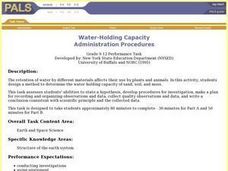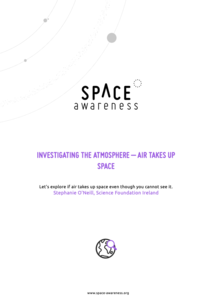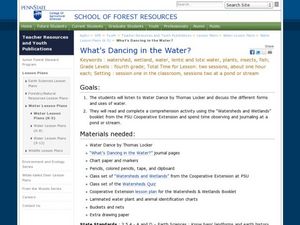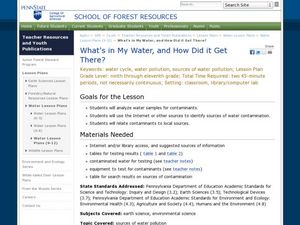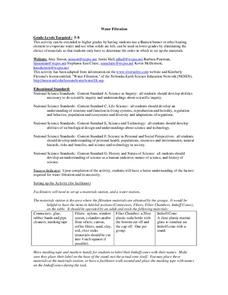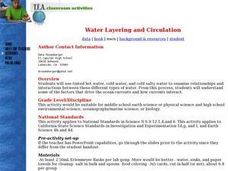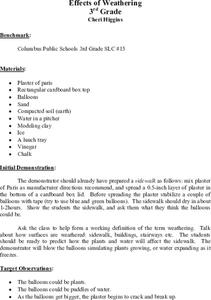Curated OER
Changing Planet: Sea Levels Rising
Begin by showing a six-minute video, Changing Planet: Rising Sea Level as an anticipatory set. Pupils draw a topographic map of a potato continent. Finally, they will visit NOAA's sea levels online map and NASA's carbon dioxide...
Curated OER
Water: Our Most Important Beverage
Third graders create a KWL chart about water. In this environmental science lesson, 3rd graders demonstrate how much water on Earth is usable. They act out the different stages of the water cycle.
Curated OER
Is There Water on Mars?
Students decide whether or not there is or has even been water on Mars. They analyze temperature and pressure data from the Pathfinder mission to Mars, and then they analyze images of Mars, interpreting the landforms they see and...
Curated OER
Water: Our Most Important Beverage
Third graders complete a KWL chart on what they already know about water and what they want to know. As a class, they participate in an activity in which they discover the amount of drinkable water on Earth and are introduced to the...
US Environmental Protection Agency
Sea Level: On the Rise
With the global temperature on the rise, the effects of climate change are starting to be seen. However, many people have a difficult time conceptualizing the long-term effects, such as sea levels rising. Given an easy and effective...
Curated OER
Debating Controversial Issues: Integrating Science and Current Events
In order to give young scientists experience with critical thinking skills, introduce them to a current controversy and prepare them to debate. Choose a topic, such as genetically modified organisms, and assign groups to represent...
Curated OER
Water-Holding Capacity
Students design and conduct an experiment to compare the water-holding capacity of sand, soil, and moss. They measure the change in weight for each material after adding the same amount of water to each material.
Curated OER
Air and Water in the Environment
Second graders participate in a three part lesson plan in which they identify and describe forms of moisture in the environment. Part one of the lesson plan involves the three stages of the water cycle, part two focuses on creating...
Space Awareness
Investigating the Atmosphere - Air Takes Up Space
How do you know there is air? Can you see it, smell it, feel it? To begin the investigation, learners watch a video and discuss what they know about air and the atmosphere. Then, they participate in five different hands-on, inquiry-based...
NOAA
Ocean Layers I
How is it possible for ocean water to have layers? The sixth installment of a 23-part NOAA Enrichment in Marine sciences and Oceanography (NEMO) program investigates factors that cause different water densities to occur. Experiments...
NOAA
Ocean Layers II
Now that you know the ocean has layers, let's name them. The seventh installment of a 23-part NOAA Enrichment in Marine sciences and Oceanography (NEMO) program covers terminology associated with ocean layers, such as thermocline and...
Curated OER
Relative Age Dating
Modeling dough and paper cutouts in science class? Learn about how relative age dating concepts, like the Law of Superposition and cross-cutting relationships, can be used to describe the formation of sedimentary layers.
Science 4 Inquiry
States and Phases of Matter
Plasma is the most common phase of matter in our universe. Scholars explore the change of energy as molecules change phases of matter. They rotate through stations, graphing the changes in energy level.
Curated OER
What's Dancing in the Water?
Students learn about watershed, as well as the different forms and uses of water. In this water forms lesson, students brainstorm water sources and uses. Students read the book Water Dance and discuss water examples. Students complete a...
Curated OER
What's in My Water, and How Did it Get There?
Students analyze water samples to see the contaminants and then use the Internet to find the sources of the contamination. For this investigative water lesson students analyze water and work together to solve the mystery of contaminants.
NOAA
Ocean Acidification
If tap water is more acidic than ocean water, why are we so concerned about ocean acidification? The third installment of a 23-part NOAA Enrichment in Marine sciences and Oceanography (NEMO) program focuses on carbon dioxide levels in...
Curated OER
Water Filtration
Students investigate our water system and how it is filtered. In this science instructional activity, students perform a laboratory activity to investigate the process that goes into filtering water. They relate this activity to other...
Curated OER
Water Layering and Circulation
Students examine relationships and interactions between different types of water. They experiment with colored water of different temperature and salinity and discuss how the results relate to real ocean currents.
Curated OER
Teaching About the Properties of Water
Students use video, Internet research, graphs and tables, worksheets and hands-on experiments to investigate the properties of water in a lake environment. They work under direction or through an inquiry process.
Curated OER
Comparing Microscopic Organisms in Fresh and Polluted Water: An Invitation To Inquiry
Pupils have the opportunity to develop and formulate ideas and explanations through the scientific standard of inquiry. They identify organisms by using an identification key for specific aquatic geographical area.
Curated OER
Rock Creek Water Quality
Ninth graders test water in a local creek using chemical kits and probes. They take GPS readings and digital photos. They calculate the Water Quality Index and create a spreadsheet of the test data.
Curated OER
Effects of Weathering
Here's a great geology lesson for 3rd graders on weathering and erosion of soil. After a class discussion on how nature can "move a mountain," learners take a look at how a modern phenoma called acid rain can also cause weathering and...
Curated OER
Clean Water vs. Dirty Water
Students study the importance of clean water to the survival of organisms and what activiities and material pollute water. They measure the temperature of water samples and create a class graph.
Curated OER
The Water Cycle - Family Page
Students discuss the steps of the water cycle. They create their own model of the water cycle. They complete the Family Page at the end of the lesson.








